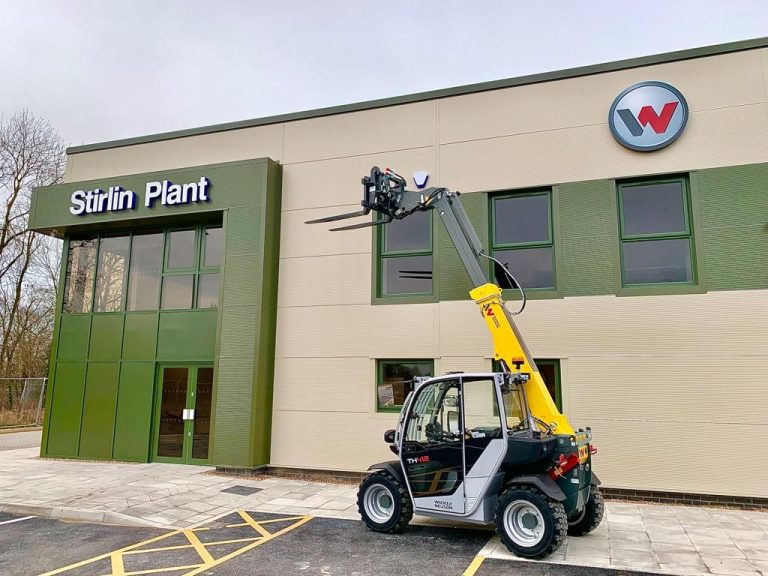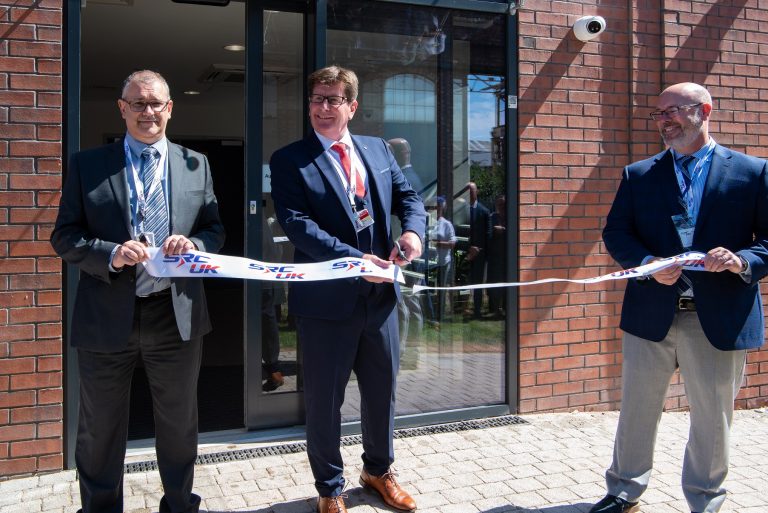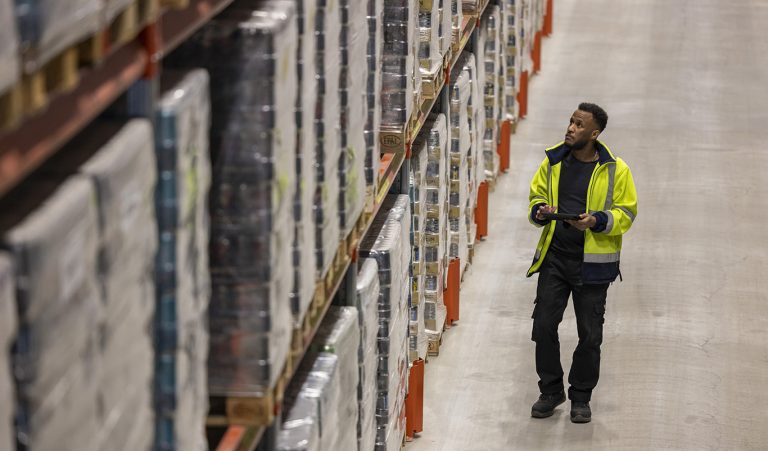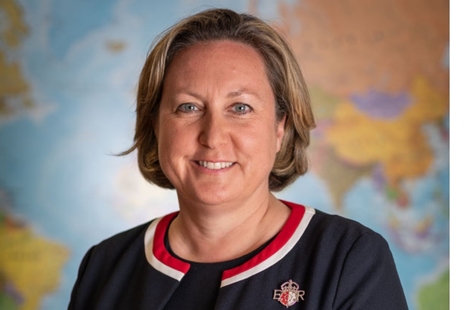Global sports performance company catapults into 34 Boar Lane in Leeds
An international sports performance analysis company is moving into the iconic 34 Boar Lane in Leeds.
Catapult has just agreed a deal to take 5,608 sq ft of office space on the second floor of the recently refurbished building.
Owner Kinrise is behind the transformation of 34 Boar Lane, a 57,000 sq ft building with 46,000 sq ft of office space over five floors and cafes and restaurants on the ground floor. It is located immediately opposite Leeds Railway Station in the heart of the city’s professional and retail quarters.
Victoria Harris, office agent at global property consultancy Knight Frank in Leeds, which is marketing 34 Boar Lane, said: “This significant deal is a resounding endorsement of the quality of this magnificent building, with a company with offices across the world choosing 34 Boar Lane.
“Ever since we started marketing 34 Boar Lane, we have been choosing our tenants very carefully. The spirit and ethos of the building is crucial. Catapult is a fast-growing growing and progressive global company and fits this aspirational culture perfectly.
“During the past three years, we have transformed this well-positioned building into an exciting workplace at the forefront of the Leeds market. Three floors have been fully let, to successful professional companies, leaving just 10,486 sq ft on the first floor and 4,887 sq ft on the second floor.”
Samuel Lawson Johnston, co-founder of Kinrise, explained: “It is very exciting to announce this significant new office deal with Catapult and we are delighted to welcome such a successful company with a global reach to 34 Boar Lane.
“This special building has been regenerated into an inspiring collaborative environment that offers our tenants characterful, design-led office and co-working space with top technology as well as an exciting range of independent restaurants, shops and event space.
“Our aim at Kinrise is to create space to inspire and enable. We do this by transforming iconic but un-loved buildings into creative work and social spaces for our tenants and public to love coming to. Our restore over rebuild philosophy allows us to play our part in ensuring the city’s heritage, unique culture and soul lives on.”
Duo of businesses move into Sheffield’s UKSE Innovation Centre
Sheffield’s UKSE Innovation Centre has welcomed two new technology-led businesses to its roster of tenants, including recruitment platform Nightingale App and management consultancy 3B Impact.
The move sees Nightingale App – an online marketplace that directly connects primary and urgent care professionals with service providers and shifts without the need for recruitment agencies – commit to 410 sq ft of space.
3B Impact, which co-creates solutions to maximise the positive impact of investors, businesses, start-ups, NGOs and institutions while ensuring economic sustainability, has also leased 320 sq ft of office space to house its UK team.
Speaking of the decision to take space within the Innovation Centre, 3B founder Stephen Blakeley said it would further strengthen the company’s existing relationships across the region, and the technology talent that exists within the city.
The business, which also has offices in Copenhagen, already partners with the University of Sheffield, including managing a pre-accelerator programme for budding innovation companies.
The arrival of both 3B Impact and Nightingale means that the Portobello Street-based UKSE facility only has five units to let, with a number of other tech start-up companies and businesses already taking advantage of the site.
In addition to the Innovation Centre, UKSE also invests in start-ups and SMEs in steel towns across the UK, to help businesses expand and create job opportunities.
Welcoming the new tenants Steve Lyon, area manager at UKSE, said: “We’re delighted to welcome our latest tenants to the UKSE Innovation Centre, which is ideally situated in the City Centre, and in close proximity to both of the Universities which are a great source of talent.
“South Yorkshire is renowned for its engineering and manufacturing excellence, but it also has an incredibly strong network of businesses operating in the digital sector.
“Both 3B Impact and Nightingale App are a perfect example of the type of innovative, tech-led businesses that are choosing to call Sheffield ‘home’.”
Stephen Blakeley, founder and partner at 3B Impact, said: “We are pleased to have secured new office space at The Innovation Centre.
“While our client base is international, we wanted to find a UK base that would allow us to tap into the right kind of talent and skillset to deliver on the projects we oversee. Sheffield has a long-standing reputation as a technology start-up hub, and with our connections to the University it seemed like an obvious choice for our UK team.”
More businesses urged to get on board with Barnsley Digital Media Centre
Barnsley digital media centre has launched a new website to showcase its thriving collaborative business community and introduce new ways to get involved.
The interactive website provides an insight into DMC 01, opened in 2007, and DMC 02 which opened in 2020 – the landmark buildings at the heart of The Seam digital campus in Barnsley town centre.
New online functions will allow people to sign up for tours of the centres, book meeting rooms, sign up to events, and ask about new monthly membership packages through which more businesses can join the DMC community and access its cutting-edge co-working spaces and facilities.
Marketing manager Matthew Snowden said: “We are very positive about the future at the DMC and want to use our new website to celebrate the role of the DMC business community in tech innovation and creative thinking, which feeds into and benefits other sectors and boosts the wider Barnsley economy.
“Our new website will allow us to shout about what’s happening at the DMCs and highlight the opportunities on offer here, from events, workshops and accelerators to high-value job creation in the creative and digital industries.
“DMC 02 is now fully occupied, and DMC 01 is back to pre-Covid capacity. It is buzzing and really is a place of possibilities.”
DMC 01 is home to more than 50 businesses and specialises in supporting entrepreneurs to start-up and scale their enterprises. It also offers collaboration space for companies in all sectors wanting to do more with technology in their business.
Across the road, DMC 02 provides much-needed space for eight growing companies, with larger office space, co-working space and a MakerLab for tech innovation using 3D printers, laser cutters and virtual reality tools.
The DMCs are owned and managed by Barnsley Council and are home to the Enterprising Barnsley business support team and South Yorkshire-wide Launchpad start-up support service.
Labour market issues are a ticking time bomb for business, says BCC
British Chambers of Commerce Head of People Policy Jane Gratton has said it’s vital to get economically inactive people back to work, and has Calle don the Government to make it happen.
Respnding to the latest ONS figures, she said: “The labour market remains incredibly tight adding to the growing list of concerns businesses are facing. This is a ticking timebomb for firms up and down the country.
“Today’s figures show little improvement for employers over the last quarter. Despite the small increase in employment levels, the number of job vacancies in the economy remains around the highest on record. Competition for skills and labour continues to drive up wage costs.”
“Skills and labour shortages have reached crisis point for many firms. The impact is being felt on their ability to meet customer demand and forcing some to turn away new business, because they simply do not have the human resource. This is restricting growth and business confidence. It’s a serious and urgent problem.
“On top of all of this, firms are now grappling with the highest inflation in almost 40 years; the largest spike in interest rates in three decades; ongoing supply chain disruption; and eye watering energy bills. There is a limit to how much additional cost business can absorb.
“The Government can help ease the growing pressure in the labour market at no extra cost to the Exchequer. We need an immediate review and reform of the Shortage Occupations List to include more jobs at all skill levels. This will give firms breathing space to train and upskill their workforce. We have over a million more job vacancies than people available to work, so the sooner we start the SOL review, the better.
“We also need to encourage economically inactive people back into the UK labour market through access to publicly funded rapid retraining opportunities. Businesses must be part of the solution too by creating the right workplace conditions, for example by providing flexible working practises, training opportunities and a focus on workplace healthcare and support.
“We cannot see another month of the same old news, it’s time for action and we’re offering the solution. It’s time for the Government to listen.”
Buy-out at family-run water treatment company
A family-run water treatment company has been acquired by the founder’s daughter in a seven-figure deal backed by Mercia’s SME Loans fund.
The buy-out of Yorkshire-based Excel Water gives control of the business to Emma Armitage, the current Managing Director, and allows for the partial retirement of her brother Darren Field. Emma now aims to increase turnover by 20% in the year ahead and create four new jobs as the company targets growth resulting from opportunities including water deregulation.
Excel Water, which is based in Allerton Bywater, manufactures and instals commercial water treatment systems for businesses throughout the country – typically those producing goods such as food, pharmaceuticals, automotive and cleaning products which require a higher quality of water for production purposes.
Excel Water was established in 1992 by Brian Field who had previously worked in the water industry. It currently employs nine staff including Darren’s son James Field. Emma joined the company in 2004 after working in the waste management sector and has been Managing Director since 2014.
Emma Armitage said: “I am proud to be taking over the family business and plan to make the most of the opportunities ahead. The deregulation of the water industry in recent years has given companies greater control over their water supply, enabling them to save on their utility bills. At the same time there is greater focus on saving water for environmental reasons. I look forward to working with our loyal team to take the firm to the next stage of its development.”
Andy Heaton of Mercia added: “Emma is a very impressive leader who has built a strong team. We are pleased to be able to back the buy-out of this successful family business in a deal that will help secure its future and the jobs of its staff, and position it for future growth.”
Paul Grace of YBFA provided fundraising advice to the company. He said: “It’s been a pleasure to work with Emma and structure the funding for the management buy-out. Since we first met, her passion and enthusiasm has shone through, and I have full confidence the business will go from strength to strength.
“Mercia demonstrated a thorough understanding of the business and provided a unique funding structure which enabled the buy-out to take place while allowing sufficient cash to be reinvested for future growth.”
Plant machinery supplier moves into new 5,000 sq ft HQ
Plant machinery supplier, Stirlin Plant, has moved into a new headquarters near Lincoln.
The new HQ occupies a prominent position on Riverside Enterprise Park in Saxilby (a commercial development by Stirlin and Castle Group), adjacent the A57 trunk road, with proximity to Lincoln City Centre and easy access to the Lincoln Bypass.
The 5,000 sq ft office and warehouse was designed by Johnathan Roberts Architects and built by established property developer and construction company, Stirlin.
Sales manager of Stirlin Plant, Ady Brodrick, says: “We are thrilled to have now moved into our new HQ in Saxilby. The purpose-built facility provides us with the space to expand our team, our services and our product portfolio, as well as allowing us to provide a more streamline experience for our customer base.
“The spacious new premises gives us treble the workshop space, with contemporary meeting rooms to host client meetings and a larger display area to showcase our extensive product range.
“We are extremely grateful for our loyal and supportive customers and our supply partners, who have contributed to our exciting growth. We’re looking forward to the new opportunities the new HQ will bring and to inviting our customers over for an official open day when we’re settled in. Thank you to the team at Stirlin for all their hard-work.”
Tony Lawton, Managing Director of Stirlin, says: “We are delighted to have brought this project to a successful fruition and hand Stirlin Plant the keys to their new HQ. It’s been a pleasure to work with them throughout the design and construction process and bring their ideas to life, providing the space for their business to grow.”
Expanding tech company brings jobs and investment to Lincoln
A rapidly expanding company has moved into a unique building in Lincoln to accommodate its growth and high-spec tech requirements.
Since 2019, research and development business SRC UK has grown from 1 employee to 30 and the company is looking to double in size again by the end of the year. Its core business is with the Ministry of Defence, providing analytical software, big data analytics, consultancy and training.
SRC UK was initially based in the Boole Technology Centre at Lincoln Science & Innovation Park but this month moved into the Gravity R&D building part of the Park’s second phase of expansion. This specially designed facility, part funded by the Greater Lincolnshire LEP and the Midlands Engine, was developed for firms like SRC UK.
 “The Gravity Building gives us enough space to grow into,” says Steve Davies, SRC UK’s managing director. “And its sophisticated design is ideal to our needs.” This means that SRC UK can run its own software and produce its own data within the building on a unique cloud-based system as well as provide innovative space for other local companies to use.
Steve, worked in the RAF as a Weapons Systems Officer for 36 years and was retiring just as the opportunity to set up the UK division of US-based research and development company SRC Inc came up. “I was in the right place at the right time with the core skill set that they needed,” says Steve. “Since then, everybody who has joined has played a vital role to get us to where we are today so quickly.”
“Our ethos is centred around collaboration; whether that be creating a new way of working with other companies, the unique way we build the company around graduates or building new products based on our people’s ideas.”
The company has broken the mould with how the government works with graduates in the sensitive area of big data analytics. “Initially, the government would only work with people with decades of experience in this niche area. We take STEM graduates with a sound educational background and layer on targeted training so they have specific experience and skills and they evolve into the job that suits that individual the most.” This blended approach has led to SRC UK being the first company in the UK to have early career graduates supporting MOD data production.
SRC UK is a not-for-profit company committed to making a positive impact on the city and county. It aims to employ locally, including graduates from the University of Lincoln, collaborate with local businesses and to use local resources. SRC UK, which is a disability confident employer, has signed up to the Lincoln Social Responsibility Charter and supports charities such as the Give an Hour scheme where staff volunteer in local schools, the C2C2C charity bike ride around Lincolnshire and Lincoln food banks.
“We see ourselves as a responsible company which is very keen on generating revenue and jobs for Lincoln and being part of the Science Park’s community and its continuing expansion,” says Steve.
“The Gravity Building gives us enough space to grow into,” says Steve Davies, SRC UK’s managing director. “And its sophisticated design is ideal to our needs.” This means that SRC UK can run its own software and produce its own data within the building on a unique cloud-based system as well as provide innovative space for other local companies to use.
Steve, worked in the RAF as a Weapons Systems Officer for 36 years and was retiring just as the opportunity to set up the UK division of US-based research and development company SRC Inc came up. “I was in the right place at the right time with the core skill set that they needed,” says Steve. “Since then, everybody who has joined has played a vital role to get us to where we are today so quickly.”
“Our ethos is centred around collaboration; whether that be creating a new way of working with other companies, the unique way we build the company around graduates or building new products based on our people’s ideas.”
The company has broken the mould with how the government works with graduates in the sensitive area of big data analytics. “Initially, the government would only work with people with decades of experience in this niche area. We take STEM graduates with a sound educational background and layer on targeted training so they have specific experience and skills and they evolve into the job that suits that individual the most.” This blended approach has led to SRC UK being the first company in the UK to have early career graduates supporting MOD data production.
SRC UK is a not-for-profit company committed to making a positive impact on the city and county. It aims to employ locally, including graduates from the University of Lincoln, collaborate with local businesses and to use local resources. SRC UK, which is a disability confident employer, has signed up to the Lincoln Social Responsibility Charter and supports charities such as the Give an Hour scheme where staff volunteer in local schools, the C2C2C charity bike ride around Lincolnshire and Lincoln food banks.
“We see ourselves as a responsible company which is very keen on generating revenue and jobs for Lincoln and being part of the Science Park’s community and its continuing expansion,” says Steve.
 “The Gravity Building gives us enough space to grow into,” says Steve Davies, SRC UK’s managing director. “And its sophisticated design is ideal to our needs.” This means that SRC UK can run its own software and produce its own data within the building on a unique cloud-based system as well as provide innovative space for other local companies to use.
Steve, worked in the RAF as a Weapons Systems Officer for 36 years and was retiring just as the opportunity to set up the UK division of US-based research and development company SRC Inc came up. “I was in the right place at the right time with the core skill set that they needed,” says Steve. “Since then, everybody who has joined has played a vital role to get us to where we are today so quickly.”
“Our ethos is centred around collaboration; whether that be creating a new way of working with other companies, the unique way we build the company around graduates or building new products based on our people’s ideas.”
The company has broken the mould with how the government works with graduates in the sensitive area of big data analytics. “Initially, the government would only work with people with decades of experience in this niche area. We take STEM graduates with a sound educational background and layer on targeted training so they have specific experience and skills and they evolve into the job that suits that individual the most.” This blended approach has led to SRC UK being the first company in the UK to have early career graduates supporting MOD data production.
SRC UK is a not-for-profit company committed to making a positive impact on the city and county. It aims to employ locally, including graduates from the University of Lincoln, collaborate with local businesses and to use local resources. SRC UK, which is a disability confident employer, has signed up to the Lincoln Social Responsibility Charter and supports charities such as the Give an Hour scheme where staff volunteer in local schools, the C2C2C charity bike ride around Lincolnshire and Lincoln food banks.
“We see ourselves as a responsible company which is very keen on generating revenue and jobs for Lincoln and being part of the Science Park’s community and its continuing expansion,” says Steve.
“The Gravity Building gives us enough space to grow into,” says Steve Davies, SRC UK’s managing director. “And its sophisticated design is ideal to our needs.” This means that SRC UK can run its own software and produce its own data within the building on a unique cloud-based system as well as provide innovative space for other local companies to use.
Steve, worked in the RAF as a Weapons Systems Officer for 36 years and was retiring just as the opportunity to set up the UK division of US-based research and development company SRC Inc came up. “I was in the right place at the right time with the core skill set that they needed,” says Steve. “Since then, everybody who has joined has played a vital role to get us to where we are today so quickly.”
“Our ethos is centred around collaboration; whether that be creating a new way of working with other companies, the unique way we build the company around graduates or building new products based on our people’s ideas.”
The company has broken the mould with how the government works with graduates in the sensitive area of big data analytics. “Initially, the government would only work with people with decades of experience in this niche area. We take STEM graduates with a sound educational background and layer on targeted training so they have specific experience and skills and they evolve into the job that suits that individual the most.” This blended approach has led to SRC UK being the first company in the UK to have early career graduates supporting MOD data production.
SRC UK is a not-for-profit company committed to making a positive impact on the city and county. It aims to employ locally, including graduates from the University of Lincoln, collaborate with local businesses and to use local resources. SRC UK, which is a disability confident employer, has signed up to the Lincoln Social Responsibility Charter and supports charities such as the Give an Hour scheme where staff volunteer in local schools, the C2C2C charity bike ride around Lincolnshire and Lincoln food banks.
“We see ourselves as a responsible company which is very keen on generating revenue and jobs for Lincoln and being part of the Science Park’s community and its continuing expansion,” says Steve. Outlook upgraded as shipping company reports strong revenue growth
Shipping company DFDS upgraded its outlook for the full year on the back of strong revenue growth of 67% due to passengers returning much faster than expected and higher freight earnings, increasing EBITDA by 63%.
CEO Torben Carlsen said: “We delivered an excellent set of results for the second quarter with EBITDA increasing 63%. We are very satisfied with our performance across all business units, which demonstrates the resilience of our business and our ability to adapt to difficult market conditions. We improved our Logistics operating margins and delivered strong cash flow.
“In Ferry, volumes increased 4.1% driven by continued growth in Turkish exports to Europe, as well as an increase in capacity on our routes between Turkey and France and Turkey and Italy. We also saw passenger traffic return faster than expected as people were eager to travel again. Ferry travel also benefited from airline travel disruptions.”
While the current macroeconomic situation and continue, supply chain constraints create uncertainty regarding economic growth expectations in 2022, demand for freight services, which include to and from Grimsby and Immingham, remains robust. As a result, DFDS now expects to grow revenue by around 40% in 2022. This is based on the strong performance for the first half of 2022, higher bunker surcharge revenue, and continued recovery in passenger volumes.
Planning permission granted for new Huddersfield health campus
The University of Huddersfield has received a committee resolution from Kirklees Council to grant Reserved Matters planning permission, so that the construction of the prominent first phase building on the Southgate site that will become the home to the University’s new National Health Innovation Campus can proceed.
This follows a meeting of Kirklees Council’s Strategic Planning Committee, and the University is now looking forward to the issue of the formal decision notice so it can commence the development of the new 10,000 square metre first phase building.
It has been designed by locally-based architects AHR, who have previously worked with the University on the award-winning Barbara Hepworth Building and the Oastler Building.
This first phase of the Southgate development will include a new home for the Health and Wellbeing Academy.
The local community will also benefit from access to an award-winning podiatry clinic, a telehealth service, sports and physiotherapy clinics, parent and child clinics, mental health clinics and public-facing spaces dedicated to social science.
The new building represents a significant investment by the University, and will be the biggest construction project in the town as the construction of the University’s second-largest building proceeds.
The building will host a number of classrooms, labs and other specialist facilities for learning which will include:
- A mock-up operating theatre
- A mock-up ambulance known as a ‘simbulance’
- A community flat/dwelling that will replicate visiting patients at home
- The award-winning Podiatry Clinic, which will be open to the public
- Dedicated office and workspace for external partners
Changes on tariff rules predicted to lower costs for businesses and consumers
The Government has launched an import tariff regime expected to cut more than £750m from the cost of imports every year by reducing tariffs on hundreds of products exported from developing countries.
The Developing Countries Trading Scheme goes further than the EU’s Generalised Scheme of Preferences, and is on top of the thousands of products which developing countries can already export to the UK duty-free, and will mean 99% of goods imported from Africa, for example will enter the UK duty free.
The scheme means that a wide variety of products that aren’t widely produced in the UK will benefit from lower or zero tariffs.
Secretary of State for International Trade Anne-Marie Trevelyan said: “As an independent trading nation, we are taking back control of our trade policy and making decisions that back UK businesses, help with the cost of living, and support the economies of developing countries around the world.
“UK businesses can look forward to less red-tape and lower costs, incentivising firms to import goods from developing countries.”
The DCTS covers 65 countries across Africa, Asia, Oceania and the Americas including some of the poorest countries in the world. It removes some seasonal tariffs, meaning more options for British supermarkets and shops all year round. For example, cucumbers, which can’t be grown in the UK in the winter, will now be tariff-free during this period for the majority of countries in the scheme. The scheme also simplifies complex trade rules such as rules of origin – the rules dictating what proportion of a product must be made in its country of origin. This makes it easier for businesses like family-owned textile business DBL Group from Bangladesh to export, encouraging developing countries to play a larger role in the global trade community. Mohammed Jabbar, MD of DBL Group said: “These new rules will be a game changer for us. They mean we will be able to source our cotton from many more countries than we could before, which will make the business more competitive and our supply chains a lot more resilient.” This work is part of a wider push by the UK to drive a free trade, pro-growth agenda across the globe, using trade to drive prosperity and help eradicate poverty. This drive includes a new initiative called Platinum Partnerships, designed to grow trade between the UK and selected lower and middle-income Commonwealth countries and reduce dependency on aid. The partnerships will strengthen two-way green trade and investment, helping countries’ adaptation to climate change.











